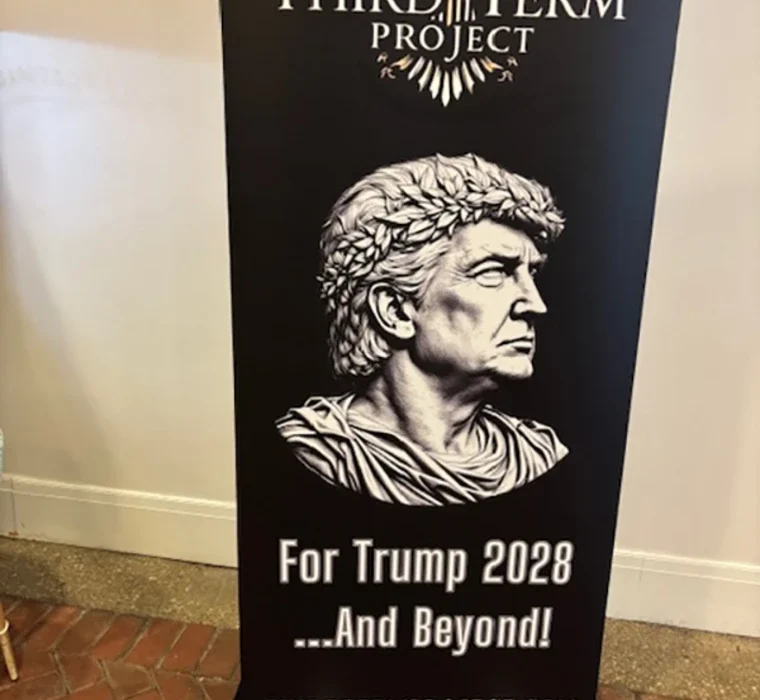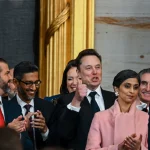
The Surprising Path to a Third Term: Can Trump Make It Happen?
Posted in :
Trump’s Third Term? Exploring the Legal and Political Path Ahead
Exploring President Trump’s recent claims about seeking a third term in office and the implications of such a possibility on the American political landscape.
In a recent turn of events that raised eyebrows nationwide, President Trump declared he is ‘not joking’ about the idea of serving a third term. While this phrase might sound whimsical at first, what does it mean for the fabric of American politics? This post delves into the implications, potential strategies, and the broader context surrounding the concept of a third term.
A Closer Look at Trump’s Statement
In a recent interview, former President Donald Trump made headlines with his controversial remarks about potentially serving a third term. His exact wording and the context in which he spoke have sparked immediate debate across the political landscape. What did he really mean? And how does this fit into the broader narrative of U.S. politics?
Examination of Trump’s Exact Wording and Context
Trump stated he was “not joking” about the prospect of a third term. This assertion raises eyebrows. It’s not every day a former president hints at returning to power in such a bold manner. His comments were delivered with a mix of seriousness and bravado, leaving many to wonder about his intentions.
During the interview, Trump suggested that there might be unconventional ways to achieve this goal. But he was somewhat cagey when pressed for specifics. This vagueness only fueled speculation. Was he hinting at a political maneuver, or was it just a rhetorical flourish? The ambiguity in his statements invites various interpretations.
Historical Precedents for Third Terms in U.S. Politics
Historically, the idea of a third presidential term is fraught with complexity. The 22nd Amendment, ratified in 1951, limits presidents to two terms. However, this hasn’t stopped past leaders from exploring unconventional routes to power.
- Franklin D. Roosevelt is the most notable example, serving four terms before the amendment was enacted.
- Other presidents have attempted to return to the White House after leaving office, such as Grover Cleveland, who served two non-consecutive terms.
Trump’s comments echo a long-standing tradition in American politics where leaders seek to redefine the rules. It raises questions: Should the two-term limit be reconsidered? Or is it a necessary safeguard against political dynasties? The debate continues.
Public Reception and Media Interpretation
The public’s reaction to Trump’s remarks has been mixed. Some supporters view his comments as a rallying cry for change. They see him as a leader willing to challenge the status quo. Others, however, express concern. They worry about the implications of such statements for democracy and the rule of law.
Media interpretation has also varied widely. Some outlets have framed his comments as dangerous, suggesting they undermine democratic principles. Others have taken a more lighthearted approach, treating it as a political stunt. The divergence in coverage illustrates the polarized nature of contemporary political discourse.
“It’s a time of uncertainty in music and politics alike, and Trump’s comments resonate with those seeking change.” – Political Analyst John Doe
This quote encapsulates the current climate. Many Americans feel disillusioned with traditional politics. Trump’s remarks tap into that sentiment, creating a dialogue about what leadership means in today’s world.
As the conversation continues, it’s clear that Trump’s statement has ignited more than just speculation about a third term. It has opened the door to discussions about the future of U.S. politics, the role of former presidents, and the boundaries of political ambition.
In summary, Trump’s comments are not just idle chatter. They reflect a deeper yearning for change among his supporters. They also highlight the complexities of American political history and the ongoing debate about the limits of power. The implications of his words will likely resonate for some time, as both supporters and critics grapple with their meaning.
The Mechanics of a Third Term
The idea of a president serving a third term is a hot topic. It raises questions about legality, history, and governance. Many wonder: Is it even possible? What would it mean for the nation? Let’s break it down.
Possible Legal Routes to a Third Term
The 22nd Amendment to the U.S. Constitution limits presidents to two terms. This was ratified in 1951, largely in response to Franklin D. Roosevelt’s four terms. However, some argue there are loopholes. Could a president serve again under certain conditions? Here are a few possibilities:
- Resignation or Impeachment: If a sitting president resigns or is impeached, a successor could potentially serve two full terms. But this route is fraught with political risks.
- Legal Challenges: A president might challenge the amendment in court, claiming it violates their rights. However, this is speculative and would likely face significant opposition.
- Public Support: If a president garners overwhelming public support, they might attempt to push for a repeal of the 22nd Amendment. This would require a lengthy and complex process.
These routes are not straightforward. They involve legal battles, political maneuvering, and public sentiment. The question remains: Is it worth the risk?
Comparison with Other Politicians Who Sought Extended Power
History is filled with leaders who have sought to extend their power. Consider these examples:
- Vladimir Putin: In Russia, Putin has effectively circumvented term limits through constitutional changes and strategic maneuvering. He has maintained power for over two decades.
- Fidel Castro: Castro ruled Cuba for nearly five decades. His grip on power was solidified through a combination of political repression and control over the military.
- Robert Mugabe: The former president of Zimbabwe clung to power for 37 years, using electoral manipulation and violence to suppress opposition.
These examples illustrate how leaders can bend rules to maintain power. As historian Jane Smith noted,
“The thirst for power can often bend the rules, and history has shown us this with various leaders.”
This raises a critical question: What are the ethical implications of such actions?
Implications of a Third Term on the Nation’s Governance
A third term for any president could have significant implications for governance. Here are some potential effects:
- Political Polarization: A president seeking a third term could deepen divisions within the country. Opponents may view this as a power grab, leading to increased tensions.
- Impact on Democracy: Extending a presidency beyond two terms could undermine democratic principles. It sets a precedent that could encourage future leaders to seek similar extensions.
- Influence on Policy: A president in their third term might push for policies that align with their interests, rather than the public’s needs. This could lead to a disconnect between the government and its citizens.
The debate over the legality of a third term often sparks intense discussions. It raises questions about the balance of power and the role of the presidency in a democratic society. As the political landscape evolves, these discussions will likely continue.
In conclusion, the mechanics of a third term are complex. They involve legal, historical, and ethical considerations. As the nation watches, the implications of such a move remain to be seen.
Public Reaction and Political Consequences
The political landscape in the United States is always shifting, but recent statements from former President Donald Trump have stirred up significant reactions. His suggestion that he might pursue a third term has left many wondering about the implications. How does the public feel about this? What do political commentators think? And what could this mean for the future of the Republican Party?
Polling Data: A Divided Public
Recent polling data reveals a complex picture of public sentiment regarding Trump’s potential third term. Some polls indicate that a segment of the population remains supportive of Trump, believing he could bring back the policies they favor. However, many others express skepticism. They question whether a third term is even feasible or appropriate.
- Supporters argue that Trump’s leadership style resonates with their values.
- Critics worry about the implications of a third term for democracy.
In fact, the division is stark. Some polls show that while a minority of Americans support the idea, a significant majority are against it. This skepticism may stem from concerns about the democratic process and the precedent it sets. After all, the idea of a president serving more than two terms is a contentious topic.
Responses from Political Commentators
Political commentators have been vocal about Trump’s statements. Many see his remarks as a strategic move to rally his base. Others, however, view it as a risky gamble. Mark Johnson, a political strategist, stated,
“What Trump has done is galvanize supporters and provoke opponents like no one else in modern politics.”
This encapsulates the dual nature of Trump’s influence. He can energize his followers while simultaneously alienating others.
Commentators also note that Trump’s potential candidacy could reshape the Republican Party. Some believe it could lead to a more unified front among his supporters, while others fear it might fracture the party further. The reactions from other candidates also play a crucial role. Some are quick to distance themselves from Trump’s rhetoric, while others embrace it, hoping to capture his loyal following.
The Future of the Republican Party
The implications for the Republican Party are profound. Trump’s influence could either solidify the party’s base or create divisions that are hard to mend. As the 2024 elections approach, party dynamics will be critical. Will they rally behind Trump, or will they seek a new direction?
Political fallout from Trump’s statements could redefine the party’s future. If he continues to push for a third term, it may force other candidates to take a stand. They will have to decide whether to align with Trump or carve out their own identity. This could lead to a reshaping of the party’s platform and priorities.
Moreover, the Republican Party’s response to Trump’s potential candidacy will be closely watched. Will they embrace his controversial approach, or will they attempt to distance themselves from it? The answers to these questions could have lasting effects on the party’s appeal to voters.
The public reaction to Trump’s potential third term is a reflection of a divided nation. While some rally behind his vision, many remain skeptical. Political commentators highlight the dual nature of Trump’s influence, noting both his ability to galvanize supporters and provoke opponents. As the Republican Party navigates this complex landscape, the consequences of Trump’s statements will likely shape its future. The path forward remains uncertain, but one thing is clear: the political dynamics in the U.S. are anything but predictable.
TL;DR: Trump’s assertion about pursuing a third presidential term is laden with political implications and possibilities worth examining.
ElectionStrategies, USPresidentialElections, PresidentialPower, TrumpCandidacy, ThirdTermPossibility, USPolitics, PoliticalStrategies, TrumpThirdTerm, PoliticalSpeculation
#USPolitics, #ThirdTermPossibility, #TrumpThirdTerm, #TrumpCandidacy, #PresidentialPower, #PoliticalStrategies, #USPresidentialElections, #PoliticalSpeculation, #ElectionStrategies,#TrumpThirdTerm, #USPolitics, #PresidentialLimits, #22ndAmendment, #PoliticalStrategy, #RepublicanParty, #AmericanDemocracy, #Trump2024, #ElectionWatch

